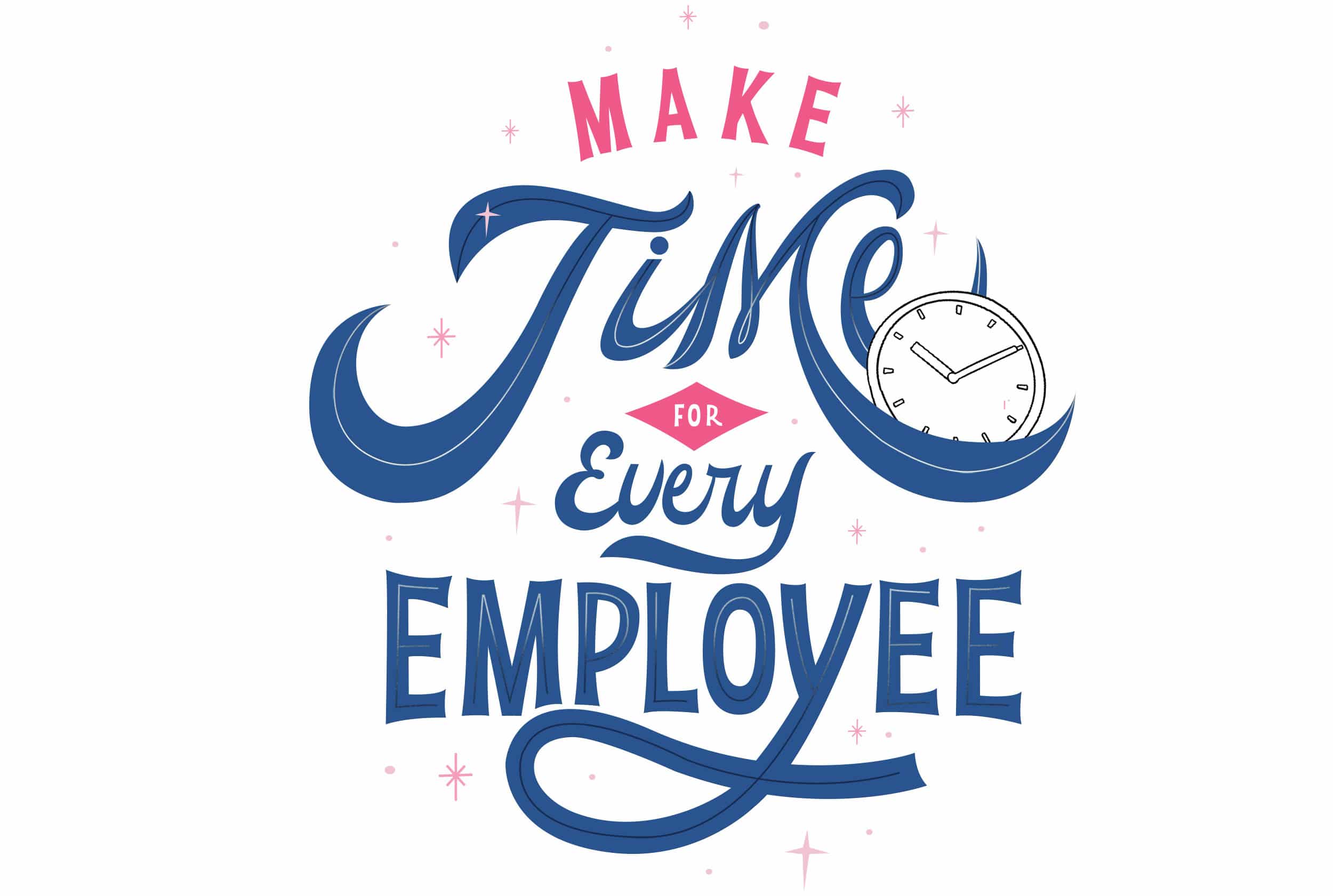
Chief Charming
16 ways to win your employees’ love without losing their self-respect.
Published
3 years agoon
IT’S FUNNY HOW, when you ask people what makes a good boss, they’ll probably tell you about their worst one. It’s human nature to remember every insult and injury from the insufferable jerk who made going to work a miserable experience, and forget the kind, mentoring soul who quietly boosted your confidence.
Another way to look at it: Enduring a horrible boss is the workplace equivalent of having to kiss a lot of frogs before finding your prince or princess.
Yes, the average sign-industry employee will have to deal with their share of penny-pinching Ebenezer Scrooges, condescending Bill Lumberghs (the “that’d be great” guy from the endless Office Space memes) and power-maddened Nurse Ratcheds in positions of leadership. Or, almost as bad, they’ll endure the leader whose apathy or inflexibility makes it impossible to get anything done. (Business management legend Peter Drucker summed up these bosses aptly: “There’s an enormous number of managers who have retired on the job.”)
 It’s true that toxic bosses from the past can offer useful lessons to small-business owners. As Robert Sutton, author of Good Boss, Bad Boss said, “It is a lot easier to learn from that guy than to be that guy.” (He also quotes Eleanor Roosevelt, who said “Learn from the mistakes of others. You can’t live long enough to make them all yourself.”) But many ineffective bosses are good people who haven’t had positive examples of how to lead and manage people. This is especially true in small sign businesses, where the owner becomes a boss by default.
It’s true that toxic bosses from the past can offer useful lessons to small-business owners. As Robert Sutton, author of Good Boss, Bad Boss said, “It is a lot easier to learn from that guy than to be that guy.” (He also quotes Eleanor Roosevelt, who said “Learn from the mistakes of others. You can’t live long enough to make them all yourself.”) But many ineffective bosses are good people who haven’t had positive examples of how to lead and manage people. This is especially true in small sign businesses, where the owner becomes a boss by default.
The first step to being a great boss is realizing there’s always room to improve. One great way to do it? Learn from others’ experiences and learn from writers and thinkers who’ve studied how smart bosses inspire their teams to produce great results. Here are some of their top tips.

1 As the boss, you are kind of a big deal. “That’s why an employee who wants to talk about something that seems inconsequential may just want to spend a few moments with you,” said Jeff Haden, who writes about how great bosses got that way. “When that happens, you can blow the employee off, or you can take the chance to inspire, reassure and motivate.”
LET PEOPLE BE THEMSELVES
2 Bosses often get their rudest awakening when they realize employees have their own ways of doing things, said Marcus Buckingham, author of First, Break All the Rules: What the World’s Greatest Managers Do Differently. If you force people to follow your playbook, then two things happen: “They become resentful — they don’t want to do it. And they become dependent — they can’t do it. Neither of these is terribly productive.”
RESCUE MISSION
3 Your greatest success may come from mentoring your least promising employee, Haden said. “Your remarkable employees don’t need a lot of your time; they’re remarkable because they already have these qualities,” he noted. “If you’re lucky, you can get a few percentage points of extra performance from them. But a struggling employee has tons of upside; rescue him and you make a tremendous difference.”
STEADY ON
4 A Google-commissioned study of more than 10,000 employee observations showed human interaction, not technical skills, was the best indicator of success for bosses. As Adam Bryant explained in his New York Times article, “Google’s Quest to Build a Better Boss,” the highest-rated managers “were even-keeled bosses who made time for one-on-one meetings, who helped people puzzle through problems by asking questions, and who took an interest in employees’ lives and careers.”

5 Counterintelligence expert Robin Dreeke has co-written a book called The Code of Trust with five rules for leadership: suspend your ego, be nonjudgmental, honor reason, validate others and be generous. Dreeke added that it’s important for bosses to identify goals and priorities, but then let go of them and work to understand what other people value, because doing so builds trust. As Dreeke said on a Knowledge@Wharton podcast, “This is my manual on how not to be the person I was born to be. This is my manual on how to overcome that Type-A hard charger that just barrels forward and ruins relationships because they think it’s all about them.”
BE MEMORABLE
6 In her book Work Happy: What Great Bosses Know, Jill Geisler shared three things employees never forget: a boss who apologizes when he or she is wrong (preferably in public, if that’s where the earlier criticism took place); a boss who reacts to a worker’s boneheaded errors with wisdom, knowing just how long to let people stew over their own mistakes; and bosses who respond to personal achievements and losses (big and small) with encouragement or empathy. On the flip side, she lists three things employees never forgive: a lying boss, a boss who takes credit for the staff’s work or ideas, and a boss who behaves differently around superiors than around the troops.
SEE YOURSELF THROUGH THEIR EYES
7 Stanford University Professor Robert Sutton has made a career writing about how to survive difficult people in the workplace and in life. After he published his book The No Asshole Rule: Building a Civilized Workplace and Surviving One That Isn’t, he received tons of stories about difficult bosses, enough to fill a sequel (The Asshole Survival Guide: How to Deal with People Who Treat You Like Dirt). But he heard about effective bosses, too, people who took “diverse and intertwined steps to create effective and humane workplaces.” He suggested that the best bosses pay close attention to how their employees see and hear them, from facial expressions to tone of voice.
ENCOURAGE FEEDBACK
8 You need to know what your employees are thinking, but they may not be willing to tell you in their employee review or even in the more casual one-to-one meetings that you’re hopefully having with them at regular intervals. Whether it’s a suggestion box in the break room or a confidential survey or focus group facilitated by a third party, give your people opportunities to suggest ways you can improve as their boss. Then let down your defenses, and take their feedback seriously.

CHILL OUT
9 It’s true that passion can inspire performance, but if you’re always yelling at your employees, it’s worth asking whether your emotions are helping or hurting business. “Personally, I’m going to assume that successful screamers make it in spite of the screaming, not because of it,” wrote Jay Goltz on The New York Times’ “You’re the Boss” blog.
PUT PEOPLE BEFORE GOALS
10 It’s good to have sales targets, but that shouldn’t be your primary focus. Without great employees, no amount of focus on goals and targets will ever pay off, said Jeff Haden. “It’s your job to provide the training, mentoring and opportunities your employees need and deserve,” he added. “When you do, you transform the relatively boring process of reviewing results and tracking performance into something a lot more meaningful for your employees: Progress, improvement and personal achievement.”

DEMYTHOLO-GIZE CRISIS
11 We’re living at a time when “our institutions seem to be in serial meltdown,” said Elizabeth Samet, a professor of English at the United States Military Academy, in her introduction to Leadership: Essential Writings by Our Greatest Thinkers. “If we live in a world of crisis, we also live in a world that romanticizes crisis — that finds in it fodder for addiction to the 24-hour news cycle, multiple information streams and constant stimulation.” Sound familiar?
But humans cannot thrive in a state of constant turmoil, so do what you can to cultivate a low-drama life and workplace. Listen to music instead of the news or talk radio on your way to work. Eat well, get adequate sleep, exercise and take time to play — and help your employees do the same things. Researchers at the Wellness Institute at Cleveland Clinic found that a workplace-based stress-management program boosted employee morale and vitality, with positive changes still evident a year later.
UNPACK YOUR POWER TRIP
12 In a conversation with psychologist Ron Friedman at the Peak Work Performance Summit, author Dan Pink cited research showing that when we feel powerful, we’re less likely to see other people’s perspectives. That’s why it’s helpful to “dial down your feelings of power just a little bit,” to see the world the way your employees do.
ADMIT YOU DON’T KNOW IT ALL
13 You may have had the vision and talent to launch your sign business, but that doesn’t mean you naturally have the skills to be a great boss. It’s smart to look for mentors and seek opportunities for leadership growth. Writing on Bloomberg.com, Rebecca Greenfield profiled executive coach Ben Olds, who helps bosses learn to have difficult conversations, harness their emotions and just plain listen. Few people are beyond help. For Travis Kalanick, founder of Uber, “Olds would want to understand what provokes him. To find that out, he would talk through some regrettable incidents, in the hope of improving his emotional intelligence and avoiding bad behavior.”
DEAL WITH THE SMALL STUFF
14 “Nothing kills team morale more quickly than problems that don’t get addressed,” said Haden. Even petty issues — squabbling employees, tardiness and negativity — are distractions that merit your action. “Small problems always fester and grow into bigger problems. Plus, when you ignore a problem, your employees immediately lose respect for you, and without respect, you can’t lead,” he said. “Never hope a problem will magically go away, or that someone else will deal with it. Deal with every issue head-on, no matter how small.”
NO HARASSMENT
15 The #MeToo movement has made it clear there are no longer any gray areas when it comes to recognizing and dealing with workplace sexual harassment. The US Equal Employment Opportunity Commission website has information on how to deal with this new reality. Go to eeoc.gov and look for “Promising Practices for Preventing Harassment.” Hire and promote all kinds of people who can give your company a wider lens on the world (and attract a broader range of customers, too).

16 Buckingham suggested that managers identify and encourage their employees’ best traits and talents. In fact, he said that’s the one defining characteristic of the best managers. “Great managers know they don’t have 10 salespeople working for them,” he said. “They know they have 10 individuals working for them.” Rather than be obsessed with your employees’ weaknesses, encourage them to do things they love to do, whether that’s window displays, social media or greeting customers.

SPONSORED VIDEO
Introducing the Sign Industry Podcast
The Sign Industry Podcast is a platform for every sign person out there — from the old-timers who bent neon and hand-lettered boats to those venturing into new technologies — we want to get their stories out for everyone to hear. Come join us and listen to stories, learn tricks or techniques, and get insights of what’s to come. We are the world’s second oldest profession. The folks who started the world’s oldest profession needed a sign.
You may like

INX Promotes Three to Vice President

6 Sports Venue Signs Deserving a Standing Ovation

Hiring Practices and Roles for Women in Sign Companies
Subscribe

Bulletins
Get the most important news and business ideas from Signs of the Times magazine's news bulletin.
Most Popular
-

 Tip Sheet4 days ago
Tip Sheet4 days agoAlways Brand Yourself and Wear Fewer Hats — Two of April’s Sign Tips
-

 Business Management2 weeks ago
Business Management2 weeks agoWhen Should Sign Companies Hire Salespeople or Fire Customers?
-

 Women in Signs2 weeks ago
Women in Signs2 weeks ago2024 Women in Signs Award Winners Excel in Diverse Roles
-

 Real Deal5 days ago
Real Deal5 days agoA Woman Sign Company Owner Confronts a Sexist Wholesaler
-

 Benchmarks18 hours ago
Benchmarks18 hours ago6 Sports Venue Signs Deserving a Standing Ovation
-

 Editor's Note1 week ago
Editor's Note1 week agoWhy We Still Need the Women in Signs Award
-

 Line Time2 weeks ago
Line Time2 weeks agoOne Less Thing to Do for Sign Customers
-

 Product Buying + Technology1 week ago
Product Buying + Technology1 week agoADA Signs and More Uses for Engraving Machines












